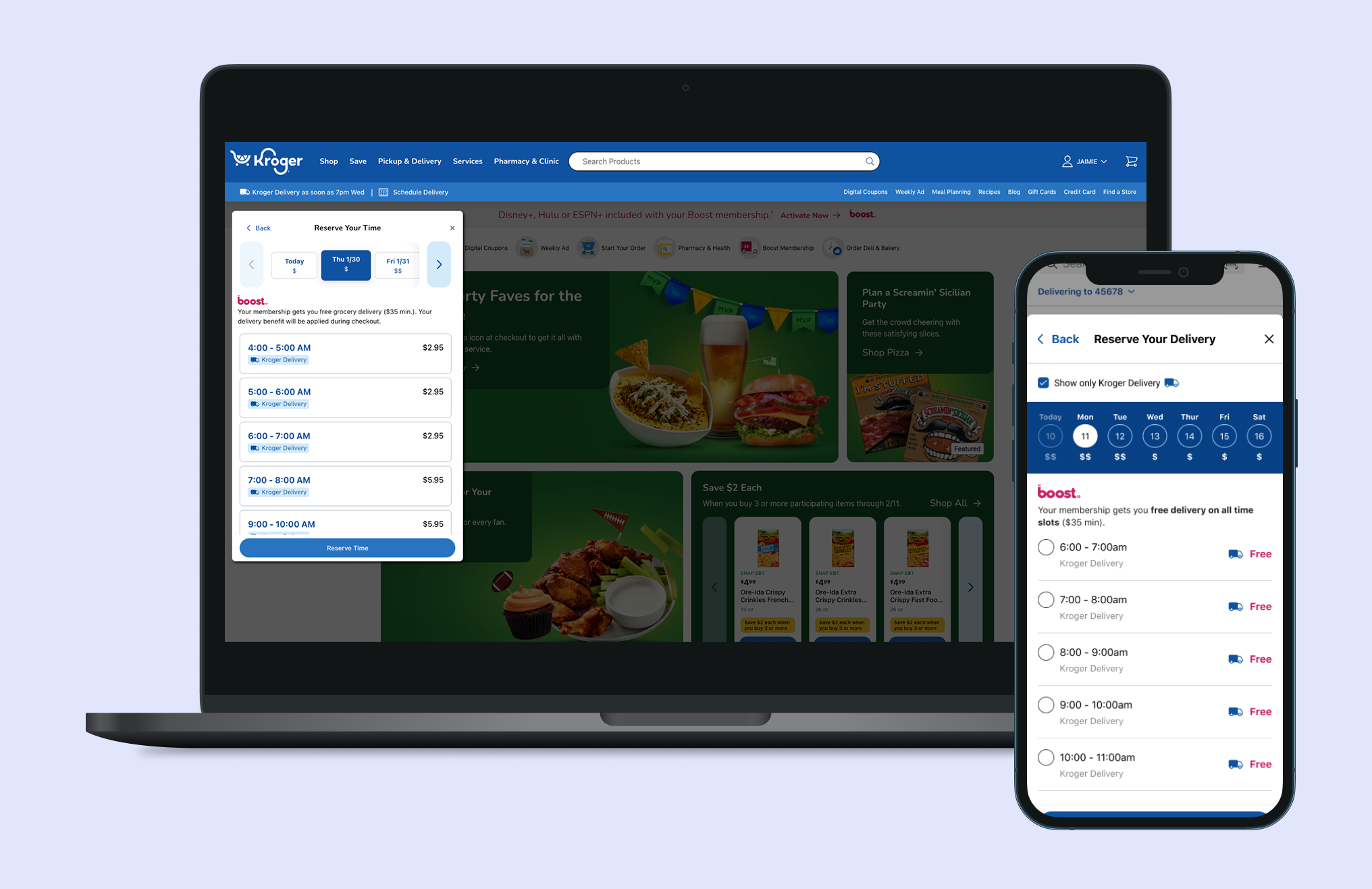Upfront Timeslots
ROLE
Lead Design Strategist
Creating clarity
Developing insights
Relationship-building
Service Design
Strategic thinking
Design thinking
Storytelling
User Research
Workshop planning and facilitation
TEAM
1 Design Strategist (Me)
2 UX/UI Designers
4 Product Managers
2 Scrum Masters
12 Engineers
Project Overview
BACKGROUND
Customer behavior started to shift post-pandemic where they now don’t want to feel like they are wasting their time and have more control over their experience. In response to the growing array of grocery fulfillment options, this shift presented a clear opportunity to support customers in identifying the solution best suited to their individual preferences and needs.
ASK
How might we make customers feel like they have control over their experience
CUSTOMER OPPORTUNITY
Give the customer control over their experience
Create confidence about receiving the service they prefer
Providing options on how to shop with Kroger
BUSINESS OPPORTUNITY
Simplify the seamless customer experience
Help customers find Kroger Delivery
Estimated annual incremental revenue
Design Process
USER RESEARCH AND PROBLEM VALIDATION
I conducted a comprehensive survey with existing customers to gain deeper insights into their preferences and expectations. In parallel, I evaluated New Promoter Scores (NPS) across all delivery services, including Kroger Delivery and Instacart Delivery, and reviewed historical research to validate the core problem we aimed to address - ensuring alignment with both business objectives and customer needs.
Research indicated that customer behavior started to shift post-pandemic where they now don’t want to feel like they are wasting their time and have more control over their experience.
What we heard from customers:
They want the option of reserving up front but don’t want to be required to do so
They want to be informed how long they have before their reservation expires but don’t want to feel pressured
They have hesitation around limiting the available assortment to shop
They do not understand the logic that enables Kroger Delivery as a fulfillment option (basket and lead time)
When placing a grocery delivery order online, when do you expect to be able to select a time slot (select all that apply)
SOLUTION PROPOSAL AND PRINCIPLES
Pull modality and timeslot selection forward in the experience
This is for pickup and delivery
Customer is defaulted to most recent modality shopped
Principle: Within delivery options, prioritize Kroger Delivery, but still offer all options
Upfront timeslot reservation will be optional, but encouraged
Reservation is defined as a customer locks in a time slot for a set amount of time for their preferred provider
Customer will have the ability to adjust their reservation prior to completing their order
Principle: Do not impact other seamless service offerings (i.e. Pharmacy, Savings)
Principle: Customer is still in control of the decision making
When modality and timeslot is selected, the experience will adjust
The selected fulfillment would determine the assortment available to add to cart (MVP)
Principle: Reduce assortment friction for the customer
Principle: Enable fulfillment specific assortment vs. modality
Reservations will be held for X amount of time with customer reminders
Reservation hold to be determined based on business/operational requirements for each modality
Leverage triggered comms to encourage completion
WORKSHOPS AND SERVICE BLUEPRINTING
I strategically planned and facilitated a series of cross-functional workshops spanning over five distinct work streams to align stakeholders and define the end-to-end customer journey. These sessions were designed to foster collaboration, build shared understanding, and drive consensus across teams. Each workshop included a structured agenda covering key activities such as customer journey mapping, service blueprinting, dependency identification, and ownership assignment for each phase of the project. By incorporating background context and aligning on goals upfront, I ensured that all participants were equipped to contribute meaningfully. The workshops also helped surface interdependencies and clarify roles, enabling teams to work more cohesively and efficiently. This collaborative approach not only strengthened stakeholder engagement but also laid the foundation for a unified vision and actionable roadmap. The outcomes directly informed design and delivery strategies, ensuring that solutions were both customer-centric and operationally feasible.
Example of Flow
SCREEN AND FLOW DESIGN COLLABORATION
I collaborated closely with domain designers across iOS, Android, and Web platforms to ensure a unified and cohesive experience. To support alignment, I provided a detailed summary of workshop insights, outlined hard requirements for each screen, and proposed flow recommendations tailored to each area. Throughout the design process, I worked to maintain a consistent vision across platforms, ensuring that all components integrated seamlessly. Additionally, I coordinated user research efforts to standardize testing methodologies, helping to ensure consistent feedback and avoid conflicting recommendations across design areas.
TESTING PLAN AND METRICS
We decided to do a phased now, next, later testing approach in order to better understand customer behavior, usage, and lower business risk.
Phase 1: Show Availability
Customer selects Kroger Delivery upfront to view timeslot availability; in checkout timeslots are filtered to Kroger Delivery only. Customer selects timeslot at Checkout
Phase 2: Make Reservation
Customer selects Kroger Delivery upfront and reserves timeslot, Customer can change timeslot/provider in checkout. Only Kroger Delivery assortment presented to customers who reserve a Kroger Delivery timeslot.
Phase 3: Extended Make Reservation
Extend timeslot reservation functionality to Pickup and Instacart Delivery
Metrics:
% of orders fulfilled by Kroger Delivery
Do no harm metrics
Orders
AOV
Checkout conversion
Item fallout and fill rate
Monitor customer comments
Final Solution
CUSTOMER VALUE
Empowered customers with greater control over their shopping experience
Facilitated proactive planning by enabling customers to schedule and organize their purchases
Enhanced online shopping accuracy by displaying only items available through Kroger Delivery, tailored to the customer’s selected fulfillment method
BUSINESS VALUE
Established clarity and alignment across the end-to-end customer journey, resulting in improved operational efficiency
Drove growth in Kroger Delivery adoption and increased the number of scheduled deliveries
Contributed to incremental revenue gains through expanded utilization of Kroger Delivery services






